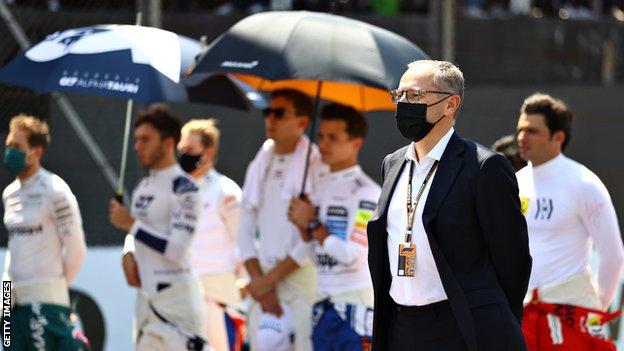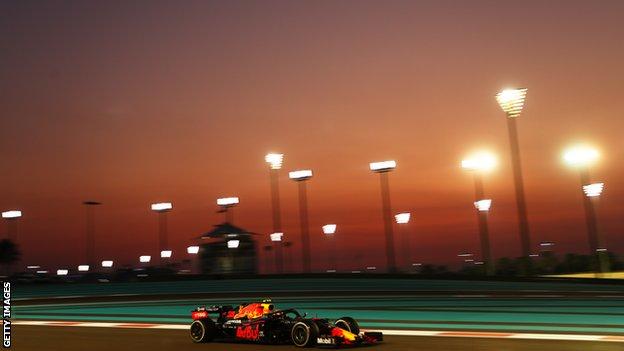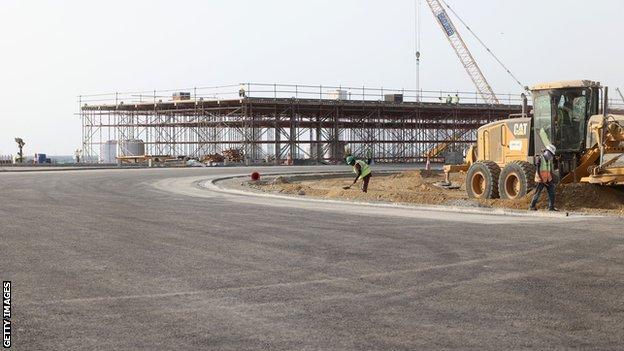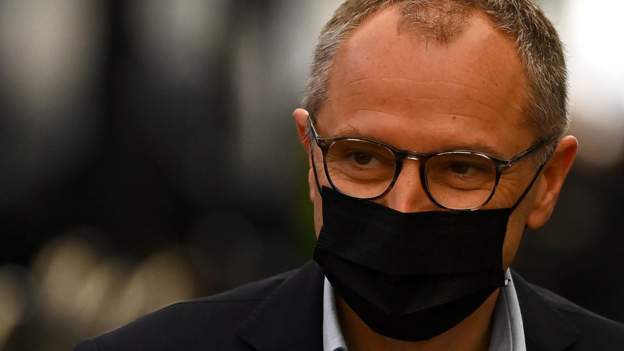
Formula 1 boss Stefano Domenicali says the new grands prix in Qatar and Saudi Arabia can help drive progress on human rights in the countries.
The Gulf states have been criticised for their human rights records but Domenicali argued that “shutting countries off” would have a negative effect.
Domenicali said: “Such an important change cannot happen overnight. It is a cultural change that will take time.
“But the timing will be accelerated by the fact big events are there. And Formula 1 will play an important role in that respect.”
Qatar holds its maiden grand prix this weekend, with Saudi Arabia following in two weeks’ time, before the 2021 season concludes in Abu Dhabi.
The two races are the latest in a series of international sporting events to be held in the fossil fuel-rich Middle Eastern countries.
These include the Fifa World Cup in Qatar next year and boxer Anthony Joshua’s heavyweight title bout with Anthony Ruiz in Saudi Arabia in 2019.
And Saudi Arabia’s sovereign wealth fund recently bought the Premier League side Newcastle United.
Domenicali, who was talking in an exclusive interview with BBC Sport, said that F1’s contracts with Qatar and Saudi Arabia contain guarantees that the countries must respect human rights in all aspects of their association with the sport. If they do not comply, Domenicali said, F1 has the right to break its contract with them.
And he said the countries were already taking actions that backed up their claims to be serious about making changes in their societies.
“If you look pragmatically at what they are doing, in terms of for example women, they have women in prominent positions in the organisation, they are working and respecting the regulations,” Domenicali said.
“I believe the spotlight we are bringing will be beneficial for the will and the wishes of change that these countries are showing.
“I don’t believe that shutting countries off and saying we don’t want to be there will help the situation to improve. Actually, it will be the opposite.
“It doesn’t mean everything is perfect, but for sure what we are doing and what we are signing off is headed in the right direction.”
He added that F1 had installed independent auditors to monitor the building of the new track in Saudi Arabia to ensure workers’ rights were fully respected.
The event in Qatar this weekend is being held on an existing track, the Losail International Circuit outside Doha.

What do human rights groups say?
Amnesty International said in a statement: “Rich countries in the Middle East have long seen elite sport as a means to rebrand and ‘sportswash’ their images, and the grand prix races in Qatar and Saudi Arabia fit into this mould.
“Both of these countries have extremely troubling human rights records – from Qatar’s systemic mistreatment of migrant workers and its draconian curbs on free speech, to Saudi Arabia’s sweeping crackdown on human rights activists and the notorious murder of the journalist Jamal Khashoggi.
“In using the glamour and razzmatazz of F1 to try to distract attention from human rights abuses, Qatar and Saudi Arabia will hope there’s little to no discussion of human rights issues around these races – something that must not be allowed to happen.
“F1, the drivers and their teams should be prepared to speak out about human rights in Qatar and Saudi Arabia in the lead-up to the races, doing their bit to break the spell of sportwashing and its intended image-management.
“In particular, F1 should ensure that all contracts for these races contain stringent labour standards across all related supply chains and infrastructure development projects, and its spokespeople – from Stefano Domenicali down – should use their influence to push for human rights improvements in both countries.”
A statement from the promoter of the Saudi Arabian Grand Prix said: “One of the main aims of hosting this event is to leverage the power of F1 to empower all men and women in the Kingdom and to use it as a means of promoting further progress to unlock the talent and potential of all our people.”
A Qatari official said: “As with other international sporting events hosted in Qatar, the partnership with Formula 1 will support economic diversification, encourage local participation in sport and serve as a catalyst to accelerate reforms.
“Qatar has embraced the spotlight that comes with hosting international sporting events and is using it to make positive and lasting changes.”

Are F1’s sustainability claims genuine?
F1 has set itself a target of being net-zero carbon by 2030 and one of the ways it plans to do this is to make sustainable fuels part of the new engine formula to be introduced in 2026.
Saudi Arabia’s national oil company Aramco, a corporate sponsor of F1, is working with the sport on developing these net-zero carbon fuels.
The Saudi government has been accused by environmental groups of working against enshrining a commitment to phase out fossil fuels at the recent COP 26 environmental summit.
But Domencali insisted that the Saudis’ commitment to sustainability in F1 was real.
“We always said that we don’t believe as a sport/business that full electrification is the only answer to sustainability,” he said.
“We believe that sustainable fuel is the right path when you know internal combustion engines are [in] billions of cars around the world that cannot be turned over to electric in the time I hear some people talk about.
“We have this big commitment that will enable a drop-in [sustainable] fuel. And I have to say Aramco is working very hard to find that technical solution applicable in the shortest time possible.
“This is something that is real and you will see soon some other things that will happen in our championship that are under our control to show we are really serious about that.
“It will allow the world to understand this is a very important future related to sustainability. It will be the easiest and the most efficient and the quickest way to be sustainable on a big scale.”
Is it all about money?
Qatar’s contract with F1 is said to be the most lucrative the sport has ever signed, and Saudi Arabia is also paying one of the largest fees for its race.
But Domenicali denied F1 needed to do these deals because of the financial losses suffered during 2020, when the season was truncated by the coronavirus pandemic.
He added: “Money is part of the business, and you don’t have to forget that without big investments you can’t develop the business. That is one thing we sometimes forget – the investments certain countries are putting into our business will be beneficial to all other people and all other countries.
“People invest because they believe in our product. This is showing how strong is the F1 platform at the moment.”
F1 is said by insiders to be on course to make more money this year than in 2019. Domenicali refused to confirm that, saying that because it is a listed company he “can’t anticipate the results”.
He admitted that “the numbers are looking good” but said this was not solely because of race fees.
“The business model of F1 is not only related to the promoters,” Domenicali said. “It is related to media rights, sponsors, licensing agreements; all these different elements are giving good results that hopefully we can disclose at the end of the season.”
